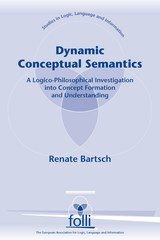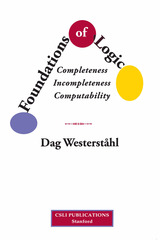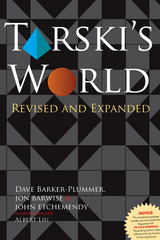3 books about First-order logic

Dynamic Conceptual Semantics
A Logico-Philosophical Investigation into Concept Formation and Understanding
Renate Bartsch
CSLI, 1998
Presented in this book is a theory of concept formation and understanding that does not make use of a notion of an innate mental language as a means of concept representation. Instead, experimental concepts are treated semantically as stabilising structuring of growing sets of data, which are sets of experienced satisfaction situations for expressions, and theoretical concepts are based on coherent sets of general sentences held true. There are two kinds of structures to be established: general concepts by means of similarity sets under perspectives and historical concepts. This gives rise to a theory of understanding new situations and expressions by integrating new data into established sets of data salva stability, or by extending the conceptual structure in a metaphorical or metonymical way. The theory provides a way to understand what identity between propositional attitudes amounts to, especially how people can have more or less the same belief.
[more]

Foundations of Logic
Completeness, Incompleteness, Computability
Dag Westerståhl
CSLI, 2023
A comprehensive introduction to logic’s central concepts.
This book provides a concise but detailed account of modern logic's three cornerstones: the completeness of first-order logic, Gödel's Incompleteness Theorems, and Turing's analysis of computability. In addition to the central text, an appendix explains the required technical terminology and facts. The main ideas behind the three cornerstones are explained in a simple, easy-to-grasp manner, and it is possible to select among the chapters and sections so that the reader becomes familiar with these ideas, even if some technicalities are skipped or postponed. A wealth of exercises accompany a wide selection of materials, including the histories and philosophical implications of the three main premises, making it useful as a textbook for undergraduate or graduate courses focusing on any of the three main themes. The material is rigorous and detailed but keeps the main ideas in sight, and there are numerous excursions into more advanced material for curious readers to explore.
This book provides a concise but detailed account of modern logic's three cornerstones: the completeness of first-order logic, Gödel's Incompleteness Theorems, and Turing's analysis of computability. In addition to the central text, an appendix explains the required technical terminology and facts. The main ideas behind the three cornerstones are explained in a simple, easy-to-grasp manner, and it is possible to select among the chapters and sections so that the reader becomes familiar with these ideas, even if some technicalities are skipped or postponed. A wealth of exercises accompany a wide selection of materials, including the histories and philosophical implications of the three main premises, making it useful as a textbook for undergraduate or graduate courses focusing on any of the three main themes. The material is rigorous and detailed but keeps the main ideas in sight, and there are numerous excursions into more advanced material for curious readers to explore.
[more]

Tarski's World
Revised and Expanded
David Barker-Plummer, Jon Barwise, and John Etchemendy
CSLI, 2004
Tarski’s World is an innovative and exciting method of introducing students to the language of first-order logic. Using the courseware package, students quickly master the meanings of connectives and qualifiers and soon become fluent in the symbolic language at the core of modern logic. The program allows students to build three-dimensional worlds and then describe them in first-order logic. The program, compatible with Macintosh and Windows formats, also contains a unique and effective corrective tool in the form of a game, which methodically leads students back through their errors if they wrongly evaluate the sentences in the constructed worlds.
A brand new feature in this revised and expanded edition is student access to Grade Grinder, an innovative Internet-based grading service that provides accurate and timely feedback to students whenever they need it. Students can submit solutions for the program’s more than 100 exercises to the Grade Grinder for assessment, and the results are returned quickly to the students and optionally to the teacher as well. A web-based interface also allows instructors to manage assignments and grades for their classes.
Intended as a supplement to a standard logic text, Tarski’s World is an essential tool for helping students learn the language of logic.
A brand new feature in this revised and expanded edition is student access to Grade Grinder, an innovative Internet-based grading service that provides accurate and timely feedback to students whenever they need it. Students can submit solutions for the program’s more than 100 exercises to the Grade Grinder for assessment, and the results are returned quickly to the students and optionally to the teacher as well. A web-based interface also allows instructors to manage assignments and grades for their classes.
Intended as a supplement to a standard logic text, Tarski’s World is an essential tool for helping students learn the language of logic.
[more]
READERS
Browse our collection.
PUBLISHERS
See BiblioVault's publisher services.
STUDENT SERVICES
Files for college accessibility offices.
UChicago Accessibility Resources
home | accessibility | search | about | contact us
BiblioVault ® 2001 - 2024
The University of Chicago Press









